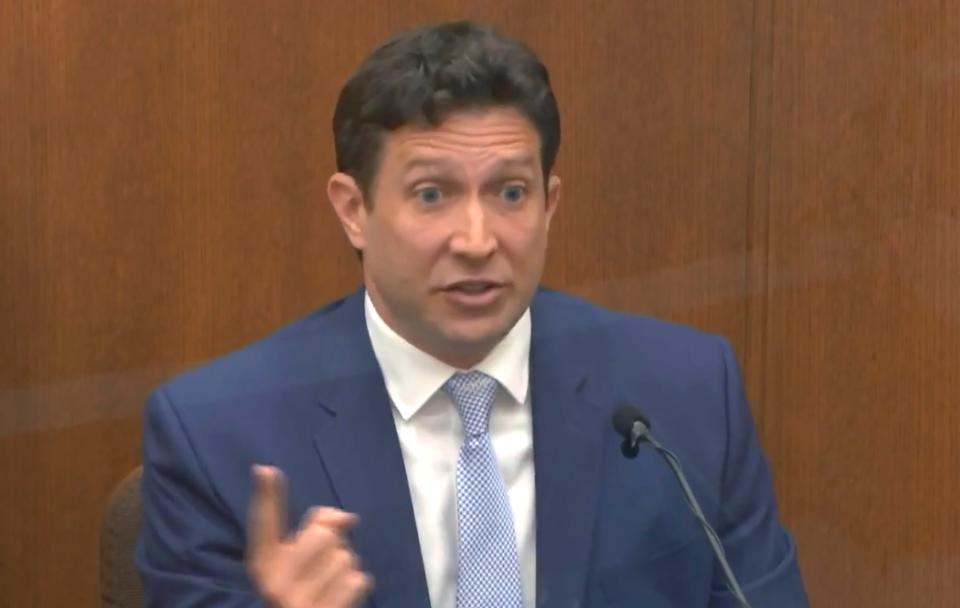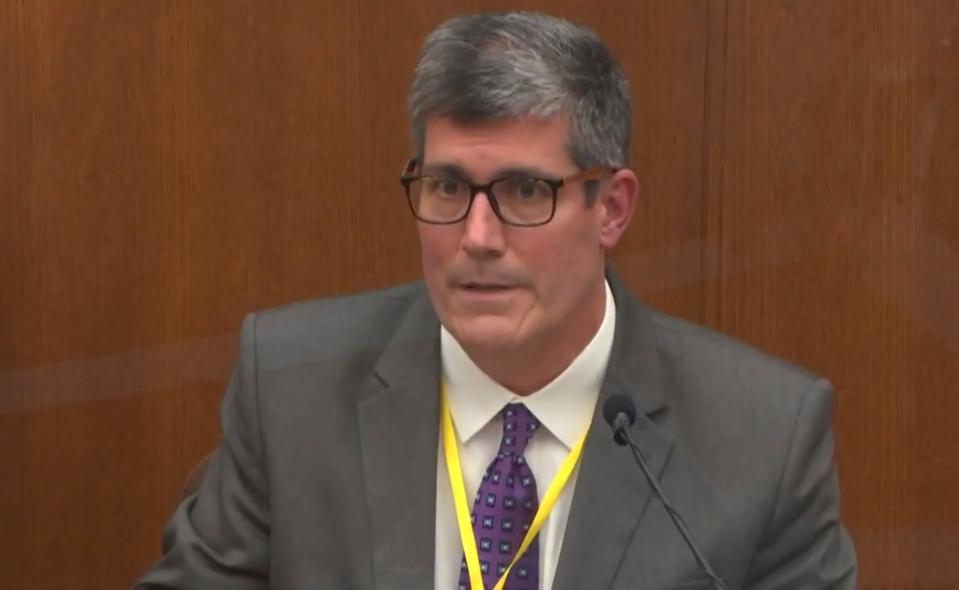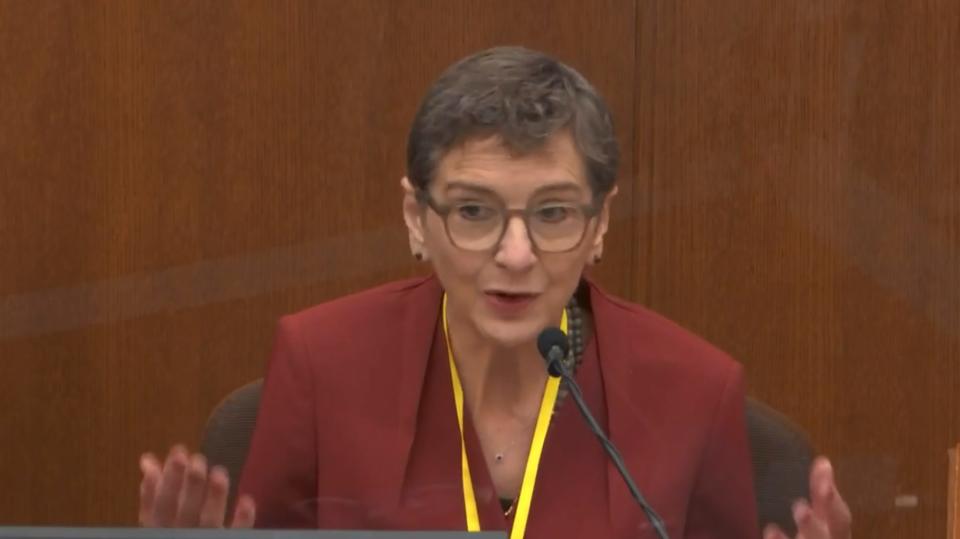Derek Chauvin trial, day 11: George Floyd's brother testifies; judge won't sequester jury amid Brooklyn Center protests, Minneapolis curfew
Follow Tuesday's coverage of the Derek Chauvin trial here.
MINNEAPOLIS — Prosecutors called an expert in police use of force to the stand Monday in the murder trial of Derek Chauvin as they prepared to wrap up their case against the former Minneapolis police officer.
Seth Stoughton, who also is a former police officer, said Chauvin's actions — placing his knee on George Floyd's neck and restraining him in the prone position — "were unreasonable, excessive and contrary to generally accepted police practices."
Chauvin is charged with second-degree murder, third-degree murder and second-degree manslaughter in Floyd's death in police custody on May 25, 2020.
Earlier Monday, the judge denied the defense's request to immediately sequester the jury following unrest Sunday night in Brooklyn Center, about 10 miles north of Minneapolis, after Daunte Wright, 20, was shot and killed by police during a traffic stop. The city of Minneapolis declared a state of emergency and a 7 p.m. curfew in response to the protests.
One juror in the Chauvin trial lives in the city, and others have "connections" to the area, defense attorney Eric Nelson said Monday morning, arguing the unrest could bias the jury's decision in Chauvin's case.
Hennepin County Judge Peter Cahill denied the motion. "This is a totally different case," he said. "That's a separate issue, and (the jury) should treat it as such. It'd be a different story if it was civil unrest following a different verdict."
Cahill told jurors he expected the defense to start presenting its case Tuesday, and for both sides to present closing arguments Monday. After that, the jury will be sequestered for deliberation. "Pack a bag," Cahill said.
Where the trial stands: The prosecution is nearing the end of its case against Chauvin. Last week, experts and police officials testified for the prosecution about proper use of force, and medical professionals testified about how Floyd died. Prosecutors asked experts to testify about the role of drugs found in Floyd's system, trying to head off the defense's argument that drugs played a key role in his death.
The defense, meanwhile, has highlighted the effect that methamphetamine and fentanyl may have had on Floyd's heart and lungs. The defense has argued a crowd of bystanders distracted and threatened the officers, preventing them from providing care to Floyd and meriting additional force.
Stay updated on the Derek Chauvin trial: Sign up for text messages of key updates, follow USA TODAY Network reporters on Twitter, or subscribe to the Daily Briefing newsletter.
Latest updates:
Court recessed until 9:15 a.m. CST Tuesday.
Seth Stoughton, an expert in police use of force, took the stand Monday afternoon.
Philonise Floyd, the brother of George Floyd, testified briefly Monday as a "spark of life" witness.
Dr. Jonathan Rich, a cardiologist at Northwestern Memorial Hospital in Chicago, testified Monday that he reviewed documents and videos and concluded Floyd died when his heart and lungs stopped working due to low oxygen levels caused by law enforcement restraint.
George Floyd's brother Rodney was in the courtroom Monday morning. Later, Keeta Floyd, who is married to Floyd's brother Philonise, was in the courtroom. Meanwhile, a woman was sitting in the courtroom chaired reserved for a Chauvin family member.
So far, jurors have heard from 38 witnesses, all called by the prosecution.
On Friday, the chief medical examiner for Hennepin County emphasized that the top-line direct cause of death from his autopsy of Floyd last May remained unchanged: George Floyd died from "cardiopulmonary arrest" as a result of him being subdued, restrained and his neck compressed by law enforcement, Dr. Andrew Baker said
Law professor Seth Stoughton: Restraint of George Floyd was 'unreasonable, excessive'
Seth Stoughton, a University of South Carolina law professor, former police officer and expert in police officers' use of force, testified Monday that "no reasonable officer would have believed that that was an appropriate, acceptable or reasonable use of force."
His repeated use of the word "reasonable" in his testimony referred to the standard that an officer can use only as much force as is objectively reasonable and necessary to arrest someone.
Along with giving jurors Stoughton’s expert views, the testimony enabled prosecutors another chance to show them multiple video clips of Floyd's increasing physical distress and decreasing speech as he was pinned to the ground.
Stoughton said placing Floyd in the prone position — on his stomach — when he was taken out of the police car was inappropriate because he did not pose a risk of assaulting the officers or fleeing.
Prosecutor Steve Schleicher asked Stoughton whether Floyd posed "any threat at all" to Chauvin and the other officers. "No," said Stoughton.
Under cross-examination, Nelson asked him, "Reasonable minds can disagree, right?" Nelson asked.
"On this point, no," said Stoughton.
Stoughton emphasized the potential for positional asphyxia if the police officers continued to keep Floyd in the prone position, combined with the weight of the officers and their gear. He said a reasonable officer would take those factors into consideration.
A reasonable officer should have taken into account that Floyd might have been intoxicated on drugs or alcohol before restraining him handcuffed in the prone position and placing his body weight on Floyd, Stoughton said.
Stoughton said that when one of the officers noted that Floyd was "passing out," that showed the risk of injury from the restraint and pressure had risen, he said.
He pointed out that a video clip showed Officer J. Alexander Kueng tried to check Floyd's pulse and was unable to find one.
"Somebody who does not have a pulse does not pose a threat in any way," said Stoughton.
Stoughton also testified that the bystanders at the scene were "pretty quiet" when officers first restrained Floyd. The defense has suggested the crowd distracted and threatened the officers.
He noted that one of the officers exchanged comments with the bystanders. "If you are worried about a crowd ... you don't say things that would exacerbate" the situation, Stoughton testified.
Nelson drew Stoughton's acknowledgment that police use of force can be lawful even though it looks bad. However, Stoughton added: "I don't think that's the case here."
Philonise Floyd: George ‘was so much a leader to us in the household’
George Floyd’s brother Philonise, 39, took the witness stand Monday afternoon. The jurors all turned in their chairs to face Philonise as he testified.
He told jurors stories about growing up with his brother as prosecutors showed photos of Floyd throughout his life – as a baby nestled on his mother’s chest, as a teen leaning over a textbook at a desk, as a basketball player at the South Florida Community College basketball team, as a father holding his daughter, Gianna.
Philonise choked up seeing the image of George and his mother. “I miss both of them,” he said. Philonise said he was married on the calendar date of May 24. His brother died May 25, and his mother died on May 30. “It’s like a bittersweet month because I’m supposed to be happy when that month comes,” he said, pausing to take off his glasses and wipe his eyes with a tissue.
Philonise said George “was so much a leader to us in the household.”
“He would always make sure we had our clothes for school. He made sure we all were going to be to school on time,” he said. George couldn’t cook – he “couldn’t boil water” – but he made the best banana mayonnaise sandwiches, Philonise said.

Philonise said he grew up playing Nintendo games with George. “I finally beat him in a game, and I was just so happy.”
Philonise talked about George’s love of sports. George excelled in basketball and football in school and earned a scholarship to South Florida Community College before transferring to Texas A&M, where he played football.
“People would attend church just because he was there,” Philonise said. “He was just like a person that everybody loved in the community. He just knew how to make people feel better.” Read more about his testimony here.
Philonise Floyd served as what's known as a "spark of life" witness.
"The victim was not just bones and sinews covered with flesh, but was imbued with the spark of life," the Minnesota Supreme Court ruled in 1985, allowing prosecutors to humanize those who had died. "The prosecution has some leeway to show that spark and present the victim as a human being as long as it is not an 'attempt to invoke any undue sympathy or inflame the jury's passions.'"
Before testifying Monday, Philonise Floyd said he wasn't nervous but that he thinks "a lot about what's going on."
"I went to sleep early, like at 8 o'clock and I've been up since 1 o'clock in the morning," Philonise Floyd said. The family calls him a "crybaby" because he's always crying, he said.
"It's OK to cry," Floyd's brother Rodney said, noting he tries to "just be strong for everyone else."
Rodney Floyd said he felt like the case was "basically shut to me." But he said he's been keeping a close eye on lead defense attorney Eric Nelson and "how he works his trickery."
Cardiologist Jonathan Rich: George Floyd died from low oxygen due to prone restraint
A cardiologist called by the prosecution Monday said he extensively reviewed George Floyd's case and concluded Floyd died when his heart and lungs stopped working due to low oxygen levels "induced by the prone restraint and positional asphyxiation that he was subjected to."
Dr. Jonathan Rich said he has published more than 200 medical papers on a wide range of cardiac subjects, and spends four to five months a year as the expert who evaluates and treats the sickest cardiac patients at Northwestern Memorial Hospital in Chicago.
Rich said the state of Minnesota asked him to help determine how Floyd died, and he's being paid $1,200 per day during his trial testimony.
Rich said he reviewed Floyd's medical records, videos of the struggle with police and the autopsy report. The prone restraint and police pressure on Floyd prevented his lungs to get enough oxygen for the body, said Rich, who also analyzed other possible causes of death, including a heart attack or drug overdose.
"I can state with a high degree of medical certainty that George Floyd did not die from a primary heart event, and he did not die from a drug overdose," he said, later adding, "my observations are he was restrained in a life-threatening manner."
The prosecution sought Rich's testimony to bolster previous trial evidence from a pulmonary expert and others who said that Floyd suffocated because he was unable to breathe properly while lying face down with his hands cuffed behind his back and while Chauvin and other officers restrained him from above.

Rich said, in his opinion, Floyd had three medical problems: high blood pressure, anxiety, and a struggle with substance abuse. He said high blood pressure can be hereditary and unrelated to the heart. "Every indication is that Mr. Floyd had an exceptionally strong heart," Rich said.
Rich said he also reviewed toxicology reports, and saw "no evidence to show a fentanyl overdose caused Mr. Floyd's death." He reached the conclusion that Floyd had "a high degree of tolerance" to fentanyl because fentanyl overdose patients are "extremely lethargic." In contrast, Floyd was energetic in the videos of the struggle, he said. Rich also said he ruled out a methamphetamine overdose because Floyd had a very low level of that drug in his system.
Rich spoke directly to the jurors, and many turned their swivel chairs to face him. When Rich said Floyd's death "was absolutely preventable," all the jurors wrote on their notepads.
Rich said if police hadn't subjected Floyd to a prone restraint, Floyd would not have died. Additionally, when Floyd appeared to pass out, Floyd might have been able to "expand his lungs again" if the officers had turned him to a side recovery position.
Rich said officers should have tried to resuscitate Floyd when they determined he did not appear to have a pulse. Rich, echoing prior testimony from a Minneapolis paramedic, said that "for every minute that transpires that you are not performing the basic life support and CPR measures, the literature would suggest an approximately 10 to 15% or less chance of survival."
Asked about Floyd's chances at pulling through after paramedics arrived with an ambulance, Rich said: "At that point, I think the chance of meaningful survival was very low.
On cross examination, lead defense attorney Eric Nelson turned jurors' attention to the condition of Floyd's heart. On Friday, the Hennepin County Medical Examiner said Floyd's coronary arteries were significantly narrowed, including 90% narrowing in one artery.
When asked by Nelson if people generally die from a 90% heart blockage, Rich said "no." Rich also pushed back on some of Nelson's medical questions and offered lengthy corrections or amendments, following the path of pulmonary expert Dr. Martin Tobin, who did the same last week.
Nelson asked Rich whether Floyd would have survived that day if he had gotten into the back seat of the patrol car, as instructed by the police officers. Rich responded by saying "had he not been restrained in the way that he was, I think he would have survived that day."
Judge won't sequester or question jury after Brooklyn Center shooting
Defense attorney Eric Nelson renewed his previous motion for sequestering the jury based on protests that took place in Brooklyn Center overnight Sunday following a police-involved shooting. The latest incident "brings it to the forefront of the jury's mindset that a verdict in this case is going to have consequences," he said.
Prosecutor Steve Schleicher opposed sequestration, in part because the shooting took place in another Minnesota city with different law enforcement authorities. However, Schleicher did not oppose questioning jurors about what they heard about the shooting and whether it might affect their judgment. "I think we can't overreact," said Schleicher.
Nelson also asked the judge to question the jurors about whether they had heard about the protests and ask whether they felt it could affect their judgement in the Chauvin trial.
Cahill denied the defense motions. He said questioning jurors about the shooting and sequestering might "heighten the jurors' concern" about personal safety and potential public reaction when the panel hands up a verdict.
2 medical experts blame police restraint for George Floyd’s death
On Friday, the chief medical examiner for Hennepin County who conducted an autopsy on George Floyd reiterated to the jury what he wrote in his report last year: Floyd's death was a homicide caused by his heart and lungs stopping amid "law enforcement subdual, restraint and neck compression.”
Dr. Andrew Baker said Floyd had “very severe underlying heart disease” and that "the law enforcement subdual and neck compression is just more than Mr. Floyd could take by virtue of his heart conditions.”
The defense has argued that Floyd's underlying heart issues and drug use contributed to his death. During questioning from defense attorney Eric Nelson, Baker said he included heart disease, the history of hypertension and the drugs in his system on the death certificate because they played a role in Floyd's death.

Baker said he did not find anatomical evidence Floyd died by asphyxia, or low oxygen. But a former Hennepin County medical examiner, who trained Baker and testified before him Friday, told the jury Floyd died from asphyxia due to officers' restraint.
“This is not a sudden cardiac death,” said Dr. Lindsey Thomas. "This is a death where both heart and lungs stop working. The point is it’s due to law enforcement subdual, restraint and compression.”
A family-commissioned autopsy released last year found Floyd's death was a homicide caused by "asphyxiation from sustained pressure." The jurors haven’t heard about that report.
More from Friday: George Floyd died from low oxygen due to officers' restraint, forensic pathologist says

What we know about Peter Cahill, the judge in the Derek Chauvin trial
In the five weeks he has presided over the murder trial of Derek Chauvin, Hennepin County District Court Judge Peter Cahill has proceeded carefully, knowing every decision will be scrutinized by the lawyers before him, everyone watching the livestream and someday possibly an appeals court.

Cahill's caution doesn't come as a surprise to his colleagues who describe him as an extremely knowledgeable student of the law known for controlling his courtroom in a respectful manner.
Michael Brandt, a longtime Twin Cities criminal defense attorney who has appeared before Cahill, 62, many times, said based on other high-profile cases, he expected the trial to be delayed in the early stages. Delays, scheduling issues and appeals are a common part of the criminal justice system, particularly in a high-profile murder trial.
But Cahill set strict deadlines and stuck to his "relatively rigid timeline," Brant said.
While Cahill has kept the proceedings moving, not everything has gone to plan. Read more on Cahill here.
This article originally appeared on USA TODAY: Derek Chauvin trial day 11: George Floyd's brother Philonise testifies

 money
money 